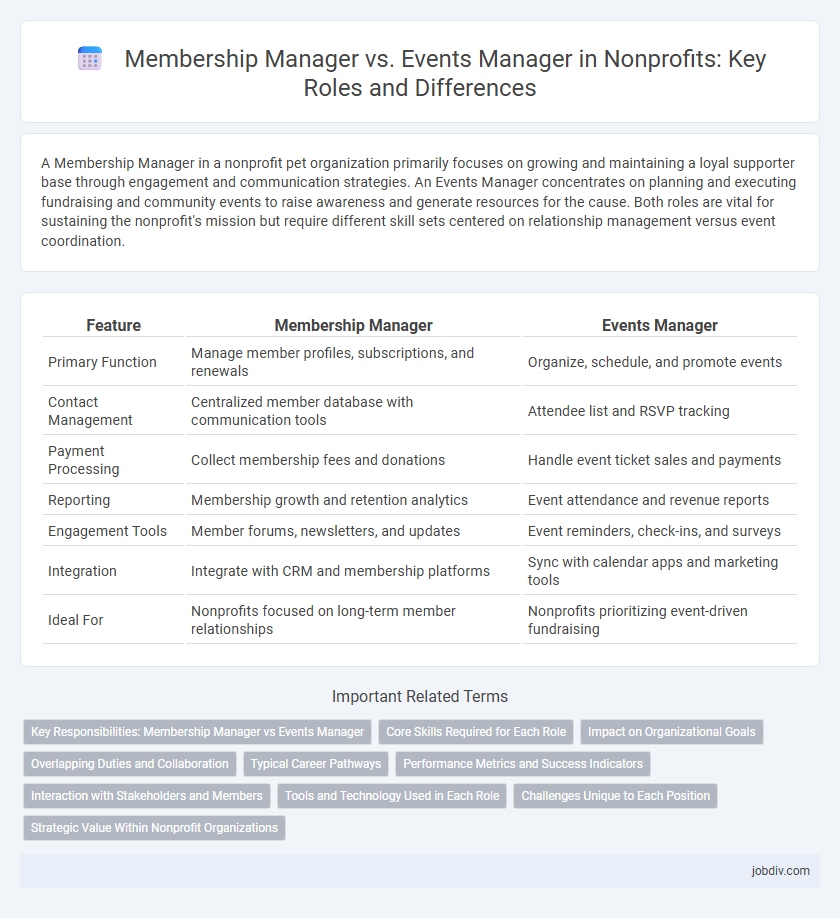A Membership Manager in a nonprofit pet organization primarily focuses on growing and maintaining a loyal supporter base through engagement and communication strategies. An Events Manager concentrates on planning and executing fundraising and community events to raise awareness and generate resources for the cause. Both roles are vital for sustaining the nonprofit's mission but require different skill sets centered on relationship management versus event coordination.
Table of Comparison
| Feature | Membership Manager | Events Manager |
|---|---|---|
| Primary Function | Manage member profiles, subscriptions, and renewals | Organize, schedule, and promote events |
| Contact Management | Centralized member database with communication tools | Attendee list and RSVP tracking |
| Payment Processing | Collect membership fees and donations | Handle event ticket sales and payments |
| Reporting | Membership growth and retention analytics | Event attendance and revenue reports |
| Engagement Tools | Member forums, newsletters, and updates | Event reminders, check-ins, and surveys |
| Integration | Integrate with CRM and membership platforms | Sync with calendar apps and marketing tools |
| Ideal For | Nonprofits focused on long-term member relationships | Nonprofits prioritizing event-driven fundraising |
Key Responsibilities: Membership Manager vs Events Manager
The Membership Manager oversees member recruitment, retention strategies, database management, and engagement initiatives to ensure a growing and active membership base. The Events Manager coordinates event planning, logistics, vendor relations, and attendee experience to deliver successful fundraising, networking, and community events. Both roles require strong communication skills but differ in focus: Membership Managers prioritize member lifecycle management, whereas Events Managers focus on event execution and impact.
Core Skills Required for Each Role
A Membership Manager requires strong relationship-building abilities, data management expertise, and proficiency in CRM software to effectively recruit, retain, and engage members. An Events Manager must possess project management skills, logistical coordination experience, and the capacity to handle budgeting and vendor negotiations to successfully plan and execute nonprofit events. Both roles benefit from excellent communication skills and an understanding of the nonprofit sector's mission and goals.
Impact on Organizational Goals
A Membership Manager drives organizational growth by increasing member engagement and retention, directly contributing to sustained revenue streams and volunteer base expansion. An Events Manager enhances visibility and community outreach through successful event planning, fostering donor relationships and public awareness. Both roles are critical, with membership efforts strengthening long-term support and events generating immediate impact and fundraising opportunities.
Overlapping Duties and Collaboration
Membership Managers and Events Managers in nonprofits often share overlapping duties such as coordinating member communications, managing registration databases, and promoting organizational initiatives to boost engagement. Both roles require close collaboration to ensure events align with member interests and maximize participation, leveraging shared marketing strategies and data insights. Effective teamwork between these managers enhances member retention and strengthens community ties through seamless event execution and personalized member experiences.
Typical Career Pathways
Membership Managers typically advance from roles in community engagement or volunteer coordination, leveraging skills in relationship management and data analysis to increase member retention and growth. Events Managers often start their careers in event planning or marketing assistant positions, honing expertise in logistics, vendor negotiation, and budget management to execute successful fundraising and awareness events. Both career paths may converge into senior roles such as Director of Development or Executive Director, emphasizing strategic planning and cross-functional team leadership within nonprofit organizations.
Performance Metrics and Success Indicators
Membership Managers are evaluated by metrics such as member retention rates, growth in active membership, and revenue generated from membership dues, reflecting their effectiveness in community engagement and sustained support. Events Managers are measured by event attendance figures, participant satisfaction scores, and post-event conversion rates, indicating their ability to execute successful fundraising and awareness campaigns. Both roles contribute to nonprofit success through distinct performance indicators aligned with organizational goals.
Interaction with Stakeholders and Members
Membership Managers cultivate strong relationships with members by maintaining regular communication, addressing inquiries, and fostering engagement to enhance member retention and satisfaction. Events Managers coordinate with stakeholders and vendors to execute successful events that promote community involvement and strengthen organizational visibility. Both roles require excellent interpersonal skills but focus on different touchpoints: Membership Managers prioritize ongoing member interaction, while Events Managers emphasize event-driven stakeholder collaboration.
Tools and Technology Used in Each Role
Membership Managers leverage customer relationship management (CRM) platforms like Salesforce and Wild Apricot to track donor data, membership renewals, and engagement metrics, ensuring personalized communication and retention strategies. Events Managers utilize event management software such as Eventbrite, Cvent, and Gather to coordinate logistics, registrations, and real-time attendee analytics, facilitating seamless event execution. Both roles increasingly rely on integrated digital marketing tools like Mailchimp and social media schedulers to enhance outreach and member interaction.
Challenges Unique to Each Position
Membership Managers face challenges such as maintaining member engagement, managing retention rates, and accurately tracking membership data to support growth goals. Events Managers must coordinate logistics, handle vendor relationships, and ensure seamless event execution while managing budgets and attendee satisfaction. Both roles require strategic problem-solving but differ in focus areas: membership growth versus event delivery excellence.
Strategic Value Within Nonprofit Organizations
Membership Managers drive sustained engagement and contribute to revenue growth by developing retention strategies and cultivating relationships with members, directly supporting organizational stability. Events Managers enhance visibility and community connection by coordinating impactful fundraising and awareness events that mobilize support and foster donor engagement. Both roles strategically align to advance the nonprofit's mission, combining sustained member involvement with dynamic public outreach for comprehensive organizational impact.
Membership Manager vs Events Manager Infographic

 jobdiv.com
jobdiv.com